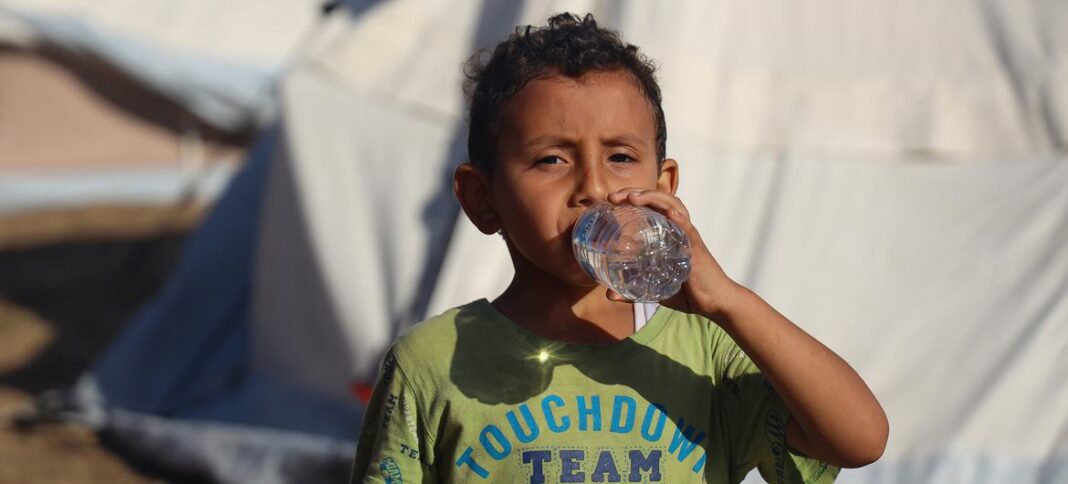They reiterated calls for access to all parts of the war-shattered enclave where the death toll inched towards 15,000 and many displaced people were sleeping in the streets.
UN humanitarian affairs coordination office (OCHA) spokesperson Jens Laerke told reporters in Geneva that the hope regarding the agreement between Israel and Hamas announced earlier this week is “that the pause is respected, that it enables us to reach the people who need us and that it will be extended into an actual humanitarian ceasefire in the long run”.
Besides the 96-hour humanitarian pause in fighting, the agreement, which was facilitated by Egypt, Qatar and the United States, stipulates the release of hostages taken during the Hamas terror attack on Israel on 7 October as well as of Palestinian detainees from Israeli prisons.
“We hope the agreement… will bring respite to the people of Gaza and Israel and some relief to the hostages and detainees who will be released, and to their families,” Mr. Laerke said.
Reaching people ‘wherever they are’
The OCHA spokesperson underscored the “volatile, intense situation” unfolding in the first hours of the truce, stressing that “the pipeline is quite long for relief and parts of it – a lot of it in fact – is beyond our control and has to do with verification of the consignments”.
Speaking of the urgency to reach people in need “wherever they are”, he highlighted the pressing need for access to northern Gaza “where the damage and humanitarian needs are the greatest” and which has long been cut off from the south of the enclave and from aid by Israeli military operations.
More hospital evacuations planned
Joining his voice to hopes for the pause to extend into a sustained ceasefire, UN health agency (WHO) spokesperson Christian Lindmeier highlighted the plight of patients and health workers trapped in north Gaza’s hospitals and said that planning and efforts towards further evacuations, notably from the Indonesia and Al-Ahli hospitals, are under way.
On Wednesday, in a joint effort between UN agencies and humanitarian partner organisation the Palestine Red Crescent Society (PRCS) 151 wounded and sick people, their family members and medical workers were evacuated from Al-Shifa hospital in Gaza City and transported in an ambulance and bus convoy to the south.
Mr. Lindmeier said that WHO is “extremely concerned about the safety of the estimated 100 patients and health workers” remaining at the hospital.
Out of 24 hospitals operating in the north prior to the war, 22 are either out of service or unable to admit new patients, while of the 11 medical facilities in the south, eight are functional. WHO said that of those, only one has the capacity to treat critical trauma cases or perform complex surgery.
Fuel for rescue operations
In the run-up to the Friday 7 am truce start time OCHA noted an increase in bombardments and violent clashes, saying that Israeli strikes from air, land and sea intensified across most of Gaza, “alongside ground battles with Palestinian armed groups in the north, Jabalia in particular”, and that many casualties were reported.
As the death toll in the enclave passed 14,800 as of Thursday evening, according to Gaza’s Government Media Office quoted by OCHA, thousands of people are estimated to be trapped under the ruins of their houses.
As part of the humanitarian scale-up OCHA’s Jens Laerke insisted on the need to get more fuel into the Strip to “operate machinery to get people out of the rubble”, given massive infrastructure damage and building collapse.
OCHA reported that 68,383 litres of fuel entered Gaza from Egypt on Thursday, following an Israeli decision from 18 November to “allow the daily entry of small amounts of fuel for essential humanitarian operations”. The UN Office said last week that some 200,000 litres of fuel per day were needed.
Mr. Laerke stressed that the fuel that goes into Gaza is “in UN custody at all times” and is being distributed by the UN agency for Palestinian refugees, UNRWA.
‘Bare minimum’
Over 1.7 million people in Gaza are estimated to be internally displaced and about one million of them are staying in more than 150 UNRWA shelters across the Strip.
Shelters in the south, where people were forced to flee by Israeli military operations, are many times over capacity and OCHA said that most displaced men and older boys are sleeping in the open, in school yards or in the streets nearby.
In a statement on Thursday, UNRWA chief Philippe Lazzarini stressed that people in Gaza “deserve to sleep without being anxious about whether they will make it through the night”.
“This is the bare minimum anyone should be able to have,” he insisted.









